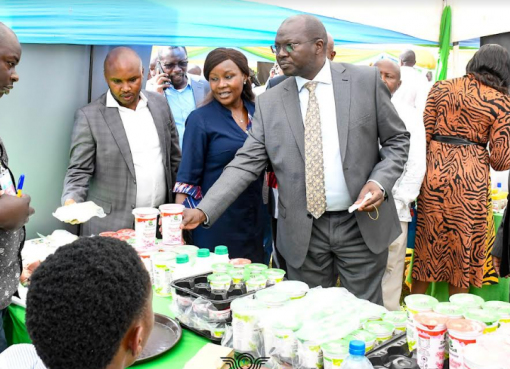The implementation of the COMESA Industrial Strategy has officially begun following the approval of an Action Plan and Regional Guidelines on Local Content Policy
Ministers responsible for industry from the 21 Member States and their representatives adopted the two instruments on Friday during the closure of the 3rd COMESA Ministerial Committee on Industry in Nairobi.
This paves the way for the implementation of the COMESA Industrial Strategy, which is aimed at supporting structural transformation of regional economies through sustainable and inclusive industrialisation.
In their decision, the ministers urged Member States to integrate activities of the Regional Action Plan into their
National Industrial Development Plans for implementation.
Further, they urged Member States to allocate budgets to implement their industrial development plans in synergy with the regional activities and in line with the Third Industrial Development Decade for Africa (IDDAIII).
The two-day meeting was chaired by the Minister of Trade and Industry of Madagascar, Lantosoa Rakotomalala, who is also the chair of the COMESA Council of Ministers.
In their final statement, the Ministers directed the COMESA Secretariat to facilitate mobilisation of financial and technical resources required for implementation of the Regional Action Plan.
The COMESA Industrial Strategy was adopted by Ministers of Industry in September 2017 who also directed the Secretariat to develop a well-costed Action Plan with timelines and responsibilities.
At the same meeting, the ministers directed the Secretariat to come up with Regional Policy Guidelines on Local Content as one way of the regional Industrialisation agenda.
The specific targets of the COMESA Industrialisation Strategy (2017-2026) are to increase value added products and exports as a percentage of GDP from the current estimate of 9 percent to 29 percent by 2026, increase the share of manufacturing to GDP to at least 20 percent by 2026 and increase intra-regional manufactured exports relative to total manufactured imports to the region from the current 7 percent to 20 percent by 2026
Regarding the Regional Guidelines for Local Content Policy, the minsters noted they will enable the formulation of Local Content Policies amongst member states in order to maximise local benefits from industrialisation.
They however, agreed that the Regional Guidelines are not binding but was a tool to simply guide Member States when formulating policy, laws and regulations on local content.
When developing the local content framework, the ministers advised Member States to take into consideration the commitments made under bilateral and multilateral agreements, bilateral investment treaties, and the existing regional and continental Free Trade Agreements to avoid the breach of those commitments.
The Secretary General of COMESA, Chileshe Kapwepwe thanked the ministers for approving the local content policy and the regional guidelines, which she noted will lead to the development of a vibrant and sustainable industrial sector that will ensure equitable benefits to all the people of COMESA Member States.
Yesterday during the official opening of the meeting, Trade and Industrialisation Cabinet Secretary, Peter Munya said there was need for goodwill and commitment of political leadership, professional, captains of industry and consumers in general in order to reap full benefits of local content.
By Wangari Ndirangu


